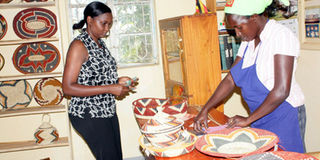Weaving cash from baskets

Kellen Kenganzi (R), a sales person with the Rubona Basket Weavers Association, issues a receipt to a client who had just bought some of her items. Photos by Edgar Batte
What you need to know:
The moment they realised they could earn a living out of their domestic products, the Rubona women have never looked back
When we arrive at Rubona Basket Weavers Association offices, we are greeted by an empty reception area. A minute later, a lady emerges from the backside of the shop with hands covered in gloves. She welcomes us with a smile, introduces herself as she slips off the gloves to offer us a handshake.
Kellen Kenganzi is the salesperson of the association and under the mid-morning sunshine, she is taking on an extra role, this time boiling dyes that will be used to design the baskets.
The reception area tells of ingenuity, with a beautiful display of baskets of different kinds in various designs and colours, fitted in simple wooden cabinets. When we settle down on the shop veranda, Kenganzi shares the story of Rubona.
How it started
“We started in 2005 with 145 members. We knew how to make baskets but we did not know their commercial value. We only used them to carry food,” Kenganzi explains.
On learning that baskets could earn them a living, she gathered her friends, Gorette Nnalongo and Eliezer Magezi and started the association.
“We made arrangements to meet the other women who were into making baskets. We talked to them about the commercial value of the baskets and we started the project,” Kenganzi recounts.
Materials used
In making the baskets, the women use millet straws, which is available given that Fort Portal is one of the top millet growing areas in Uganda.
“So after harvesting, we go back to the garden and pick the millet stems to make our baskets. We tie the raffia on the banana fibres, which we also pick from our gardens. We get the dyes from the bush. Every woman knows how to get the dyes and use them. We buy the raffia from traders in Owino (now called St Balikuddembe) Market in Kampala,” she explains about the materials they use in making baskets. In addition to this, Kenganzi says they use something unique too. It is called Amalwa G’empunu (the pig’s beer), which is a dark water mixture with plant particles that they cook on local stoves. She explains that its botanical name is Rubia cordifolia that they use to make the dyes.
“The reason it is called the pig’s beer is because pigs like eating that plant,” she adds.
Market for the baskets
Rubona women sell their baskets to tourists who visit Fort Portal on their way to Queen Elizabeth National Park.
The women are soon to benefit from linkages created for them by Support Development of Inclusive Markets in Tourism under the support of Uganda Tourism Board and United Nations Development Programme, a project that aims at growing and increasing the participation of poor and rural communities in tourism related income-generating initiatives.
The project’s finance and administration officer, Jackie Kuteesa explains that they have linkage workshops where Rubona and Ndali Lodge have agreed to work together. “Ndali wants them to supply them with baskets that they can sell to their guests and also use in their lodges.
“We also sell to one customer called Suni Magyar, who has a shop in Kampala called Banana Boat. Uganda Community Tourism Association.
In a week, she says they can make up to 100 baskets but says Magyar normally makes an order of 5,000 baskets in a month, which means they have to make a lot more baskets to meet the demand and earn the money.
Kenganzi explains that the pricing of the baskets depends on the size and quality but says the highest they charge for a basket is Shs30,000.
As an association, Kengazi says they pay for the baskets when someone brings them to their shop. “We pay cash, from Shs5,000 and upwards and after a year, we pay each woman a bonus,” she reveals.




